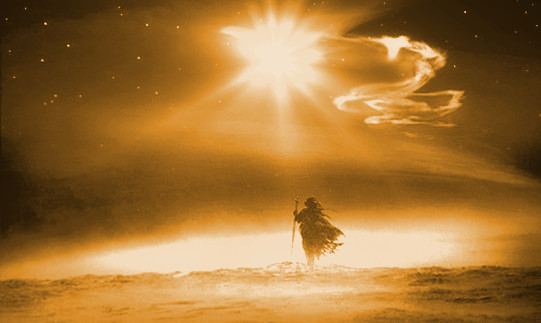 by Fr. Patrick Henry Reardon
by Fr. Patrick Henry Reardon
I wonder how many of us have considered what is implied by the juxtaposition of two biblical verses that are, I concede, juxtaposed but rarely. The first verse, from Isaiah, contains the angelic declaration,
“Heaven and earth are full of Thy glory.”
The second verse, from Job, contains the Tempter’s answer to the Lord’s question,
“Where have you been lately?”
He responds,
“Walking on the earth, to and fro, up and down.”
Now this is the Tempter’s dilemma: He is hemmed in—above and below—by the glory of God, and he can’t stand the sight of it. It prevents his getting any rest. Our Authority on the subject remarked of Satan,
“He walks through dry places seeking rest and finding none” (Matthew 12:43).
Places on the earth are “dry” to Satan for the very reason that they are full of God’s glory. Created nature, because it bears the beauty of holiness, is not congenial to demonic rest. Satan fell from grace, the ancients tell us, before this world was made, and he has never had a high regard for it.
The only places where the Tempter can find something resembling rest is in the sullied human conscience. Polluted souls are ugly and perverse, so they do afford him something analogous to quiet and repose. A compromised and unrepentant soul is the only abode in which a demon can relax and feel at home. In the absence of a rebellious human being, the devils sometimes settle for a herd of pigs (cf. 8:31). They must recognize some measure of resemblance to the pollution of sin.
Meanwhile, the Tempter, in order to avoid the burden of walking up-and-down, to-and-fro on an earth—and under a sky—full of the glory of God, endeavors to create those situations and circumstances most likely to facilitate the things he favors, such as lust, hatred, cruelty, violence, and despair. Over the centuries, for example, he has learned the value of war in this respect; hardly anything produces as much raw ugliness as a war.
The Scriptures are pretty clear that demonic forces strive to find rest from the weariness of facing God’s glory. This may be the reason they are partial to the bleak, barren terrain of the deserts. Imagine their annoyance, then, when Jesus and the saints invade the desert to fast and pray. The desert becomes a place of holiness and beauty. At that point demonic existence becomes well nigh insupportable. This is, one suspects, the reason temptations in the desert sometimes take on the quality of desperation.
Once again, our Authority on the subject of demons warns that they have been known to return to dwellings whence they were driven out. The Tempter, having wandered for a spell in dry places, resolves to re-take his former abode:
“I will return to my house from which I came.”
And what does he find?
“He finds it empty, swept, and put in order.”
Perhaps the most important adjective in this description is “empty.” That abode was once purged, but now no one really lives there, and certainly no one is guarding the place. So the Tempter, having returned, resolves to fortify his position this time:
“He goes and takes with him seven other spirits more wicked than himself, and they enter and dwell there.”
Since, in Holy Scripture, the number seven symbolizes plenitude, this reference to “seven demons” should give us pause about the “last state” of that soul. Our Authority on demons does not say,
“The soul is worse-off than it was before.”
He says, rather, that that soul’s “last state” (ta eschata) is worse. He appears to warn us here of apostasy and damnation. That is to say, the soul most at risk in this world is the one to whom the demons, once driven out, have returned.
This parable is about more than individual salvation-or-damnation, however, because it explicitly refers to history and geography:
“So shall it also be with this wicked generation” (12:44-45).
Perhaps this is the most frightening consideration of all; the parable holds out the prospect of a nation, a culture, or an entire people succumbing to final infidelity. Some centuries earlier, the Gospel had been preached in that place and among that people. The demons had been driven out; the area and its culture were swept and put in order. Sadly, however, at a later point in its history—“this wicked generation”—the demons find the place empty of all evangelical influence.
Long lost are its inoculations against evil. Careless routine has replaced careful repentance, and the returning invader arrives to write the latter pages of its history.

